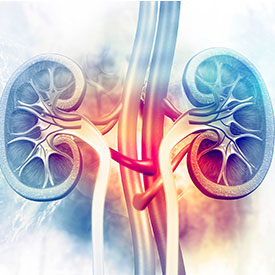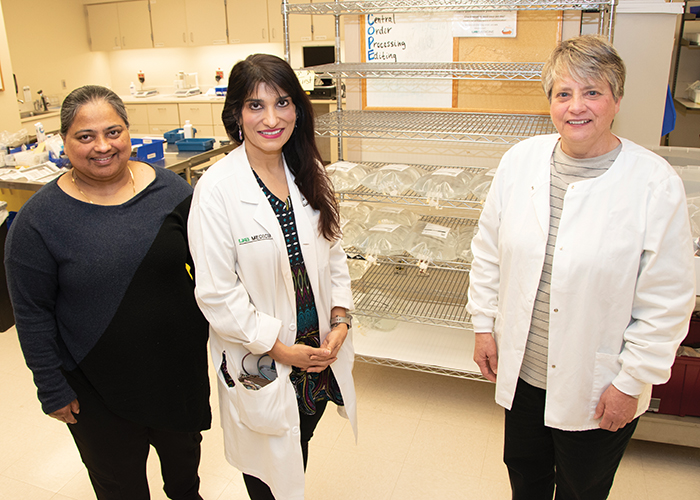 Alabama has one of the country’s highest rates of kidney disease, but recent gifts to the Division of Nephrology aim to bolster research efforts, attract and retain key talent in the state, and combat the prevalence of the disease.
Alabama has one of the country’s highest rates of kidney disease, but recent gifts to the Division of Nephrology aim to bolster research efforts, attract and retain key talent in the state, and combat the prevalence of the disease.
Ashita Tolwani, M.D., a nephrologist at UAB and a world-renowned expert on continuous renal replacement therapy (CRRT), established the Tolwani Innovation Fund in Nephrology using royalties from an anticoagulant solution she developed in 2004 at UAB and patented in 2011. The money will support investigators and researchers studying novel ideas for therapies for kidney-related diseases.
The solution—currently distributed in Canada, India, Singapore, Malaysia, Australia, New Zealand, and throughout Europe—helps critically ill patients safely receive a type of dialysis known as CRRT. CRRT is different from routine hemodialysis because it runs 24 hours a day and continuously removes fluids and toxins building up in the kidneys, Tolwani says.
“While it is far gentler than regular dialysis, it frequently requires anticoagulation to keep the dialysis circuit from clotting,” Tolwani explains. “The anticoagulation formulation developed at UAB improves the ability for us to deliver CRRT effectively and safely without having clotting issues.”
Anupam Agarwal, M.D., the director and Marie S. Ingalls Endowed Chair in Nephrology Leadership in the Division of Nephrology and executive vice dean of the School of Medicine, praises both Tolwani’s invention and initiative to create the fund that will help future researchers.
“She has set an example to enable others to take their ideas further toward a patent and to make that idea or invention be implemented for the benefit of both patients and health care providers,” Agarwal says.
Tolwani says the idea for the fund grew from discussions with Agarwal and her desire to give back to UAB, where she was encouraged and supported to find new solutions to kidney-related problems.
“If there is an innovative idea you wish to pursue at UAB, there is a way to get it done,” Tolwani says. “I am grateful I can support our innovators through this fund so they can create new innovations that will help others.”
 (From Left to Right) Research pharmacist Rajesh Speer, nephrologist Ashita Tolwani, and research nurse Brenda StofanHonoring A Leader
(From Left to Right) Research pharmacist Rajesh Speer, nephrologist Ashita Tolwani, and research nurse Brenda StofanHonoring A Leader
Throughout UAB Nephrology, faculty advance the field through their leadership skills and collaborative efforts. Stephen Rostand, M.D., has been an example of these principles his whole career. A renowned investigator and longtime faculty member, Rostand was recently honored when the Division of Nephrology renamed an existing endowed professorship the Stephen G. Rostand, M.D., Endowed Professorship in Nephrology.
“The creation of this endowed professorship in my name was a great and unexpected honor,” Rostand says. “I am pleased that my contributions to the School of Medicine, to patient care, and to the field of nephrology have made a difference.”
Rostand completed an internship and residency in internal medicine at Duke University, as well as research fellowships in nephrology at Boston University Medical Center, the University of Pennsylvania, and Duke University. He did a two-year tour in the Medical Corps of the U.S. Army, where he received the Army Commendation Medal for meritorious service.
Rostand came to UAB in 1973 as an assistant professor in the Division of Nephrology. He served as chief of Nephrology Service at the Birmingham Veterans Affairs Medical Center from 1973-1985 and as assistant chief of staff at University Hospital from 1985-1996. He is now professor emeritus in the Division of Nephrology. Rostand was the principal investigator for the Clinical Center at UAB for the African-American Study of Kidney Disease and Hypertension Trial (AASK), an eight-year multicenter study funded by the National Institutes of Health. He continued as the principal investigator of the AASK Cohort Study that followed for an additional five years.
Edward Inscho, Ph.D., professor in the Division of Nephrology, currently holds the endowed professorship in nephrology. His research focuses on the role P1 and P2 receptors play in regulating renal microvascular function in healthy and diseased kidney settings.
“Dr. Rostand’s contributions to the division have been instrumental in the growth and reputation of our programs,” says Agarwal. “This endowment will provide resources to support Dr. Inscho’s research.”
 Clockwise from top left: (left to right) Stephen Rostand; Roslyn Mannon; Michael Mrug; and Vineeta Kumar. A Talented Field
Clockwise from top left: (left to right) Stephen Rostand; Roslyn Mannon; Michael Mrug; and Vineeta Kumar. A Talented Field
In April, Vineeta Kumar, M.D., and Roslyn Mannon, M.D., became holders of endowed positions in transplant nephrology, with Kumar serving as the inaugural holder of the Robert C. and Cutessa D. Bourge Endowed Professorship in Transplant Nephrology and Mannon assuming the Robert G. Luke, M.D., Endowed Chair in Transplant Nephrology.
A fund initially established by Robert Bourge, M.D., and his wife Cutessa was elevated through additional gifts into a professorship in transplant nephrology in their names. The endowment commemorates their exceptional philanthropy, dedication, and commitment to transplant nephrology at UAB.
Bourge says he believes that philanthropy is vital to advancing the School of Medicine’s three-part mission. “With all our mission areas—in clinical care, research, and teaching—funding can wax and wane,” says Bourge, professor and senior vice chair in the Department of Medicine and former holder of the E.A. and Abbie Drummond Endowed Chair in Cardiovascular Medicine, among other roles. “I believe endowments can provide stability and help us keep the best people here at UAB and continue our history of excellence.”
The Bourges also established the Detraz Family Endowed Professorship in Polycystic Kidney Disease, an effort that hits close to home. Polycystic kidney disease is a hereditary condition with complications ranging from hypertension to kidney failure, and it often leads to the need for a kidney transplant. The disease runs in Cutessa Detraz Bourge’s family, so they designated that the fund bear the Detraz name. “Dr. Michal Mrug is an established star in that area, so I’m happy he will be the holder of this professorship,” Bourge says.
Another star is Kumar, the lead nephrologist for both the UAB Living Kidney Donor Program and the UAB Incompatible Kidney Transplant Program. She is an expert in kidney transplantation, living kidney donation, incompatible kidney transplant, kidney paired donation, and cardiovascular outcomes after kidney transplantation. She has been named a “Top Doctor” by U.S. News & World Report each year since 2012 and was named “Best Educator” by the 2018, 2019, and 2020 UAB medical school classes. Earlier this year, she was awarded the UAB President’s Award for Excellence in Teaching. “Throughout my 40 years at UAB, Dr. Kumar has been one of the most intelligent and compassionate physicians that I have ever met,” states Bourge. “I think she is the perfect fit to be named the Robert C. and Cutessa D. Bourge Endowed Professor in Transplant Nephrology.”
Mannon, a professor of medicine and surgery in transplant nephrology and the director of research in the UAB Comprehensive Transplant Institute, is the holder of an endowed chair that honors a game-changing nephrologist. Robert G. Luke, M.D., was the former division director of nephrology at UAB. In 1979, he started the first transplant nephrology service at UAB with John Curtis, M.D. The endowed chair in Luke’s name supports the important research, clinical, and educational efforts in the Division of Nephrology. Mannon personifies the recipient Luke envisioned. She studies the problem of long-term kidney graft failure. She also developed a research program in kidney and kidney/pancreas transplantation that spans the spectrum of basic science, translational studies, and clinical research.
“All of the gifts to the Division of Nephrology have an enduring impact on both our institution as a whole and our patients,” says Agarwal. “They are significant and will have lasting value.”
– Holly Gainer, Emily Henagan, Bennett Page, and Jane Longshore